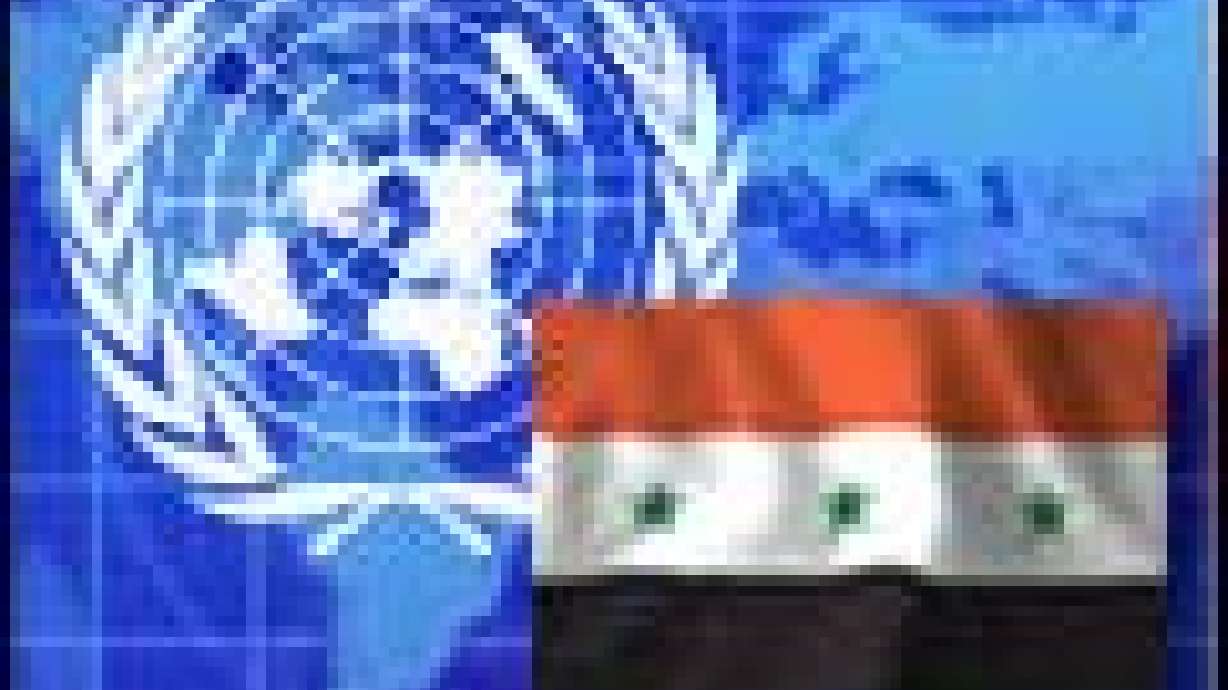Estimated read time: 4-5 minutes
This archived news story is available only for your personal, non-commercial use. Information in the story may be outdated or superseded by additional information. Reading or replaying the story in its archived form does not constitute a republication of the story.
UNITED NATIONS (AP) -- Chief U.N. weapons inspector Hans Blix said Friday that inspectors had not found any weapons of mass destruction in Iraq and interviews with scientists in Baghdad had been useful.
Mohamed ElBaradei, the chief nuclear inspector, said the process was working and Iraq's full cooperation was not necessary to verify if Saddam Hussein had nuclear weapons.
Blix also cast doubt on evidence provided by Secretary of State Colin Powell claiming Iraq had cleaned-up suspect sites before inspectors arrived.
"In no case have we seen convincing evidence that the Iraqi side knew in advance that the inspectors were coming," Blix said.
Pointing to one case Powell highlighted using satellite photos of a munitions depot, Blix said: "The reported movement of munitions at the site could just as easily have been a routine activity" as one designed to hide banned materials before inspections.
Regarding weapons of mass destruction, Blix said the inspection team "has not found any such weapons, only a small number of empty chemical munitions, which should have been declared and destroyed," he said.
He said a finding "of great significance" was that many proscribed weapons "are not accounted for. One must not jump to the conclusion that they exist.
"However, that possibility is also not excluded. If they exist, they should be presented for destruction. If they do not exist, credible evidence to that effect should be presented."
Blix also reported findings by a panel of experts that one of Iraq's new missile systems exceeds the range limit set by Security Council resolutions.
"The experts concluded that, based on the data provided by Iraq, the two declared variants of the Al Samoud 2 missile were capable of exceeding 150 kilometers (93 miles) in range. This missile system is therefore proscribed for Iraq," Blix said.
Blix said additional information was needed on a second missile, the Al Fatah, before deciding if it was in violation.
Blix said private interviews with three Iraqi scientists "proved informative," but since the interviews conducted in Baghdad on Feb. 8-9 no more had been done in private -- "on our terms."
"I hope this will change," he said. "We feel that interviews conducted without any third party present and without tape recording would provide the greatest credibility."
Under intense pressure, Iraq agreed earlier this month to prod scientists to agree to private interviews. Previously, all scientists insisted on being accompanied by an Iraqi official or tape recorded their interviews.
Blix said there were 250 U.N. personnel now in Iraq, including about 115 inspectors. He said there had been more than 400 inspections at 300 sites since the process began in November.
In his report, ElBaradei said, as he did in the previous report, that inspectors found no evidence Iraq had restarted its nuclear weapons program.
In addition, he said, inspectors did not need Iraqi cooperation.
"The IAEA's experience in nuclear verification shows that it is possible, particularly with an intrusive verification system, to assess the presence or absence of a nuclear weapons program in a state even without the full co-operation of the inspected state," ElBaradei said.
ElBaradei told the Security Council that he would add more staff -- an apparent nod to a French proposal to beef up and continue inspections in order to avert war.
"To strengthen and accelerate our ability to investigate matters of concern, and to reinstate and reinforce our ongoing monitoring and verification system that came to a halt in 1998, we intend to increase the number of inspectors and support staff."
"We will also be adding more analysts and translators to support analysis of documents and other inspection findings."
ElBaradei speech, shorter than one delivered by his counterpart Hans Blix, was not harshly critical of Iraq's cooperation so far.
He welcomed four private interviews the nuclear inspectors have conducted with Iraqi scientists. But he noted that the scientists had "tape recorded the interviews."
ElBaradei also reiterated his findings from two weeks ago that his inspectors haven't found any evidence to date that Iraq is restarting its nuclear program.
ElBaradei said the matter of high-strength aluminum tubes which Iraq tried to import had not been closed. He has said previously that the IAEA believes Iraq intended to use the tubing for conventional rockets.
On Friday he said Iraq provided new documentation on the tubes, a reported attempt to import uranium, the procurement of magnets and magnet production capabilities and the use of the explosive HMX.
"The IAEA has verified that Iraq had indeed been manufacturing such rockets. However, we are still exploring whether the tubes were intended rather for the manufacture of centrifuges for uranium enrichment," he said.
ElBaradei also used the opportunity to welcome a move by Iraq Friday to pass legislation banning weapons of mass destruction.
"The resolution of this long-standing legal matter was a step in the right direction for Iraq to demonstrate its commitment to fulfilling its obligations under the Security Council's resolutions."
He noted that Iraq also had accepted U-2 reconnaisance flights and said inspectors planned to make use of the capabilties to monitor Iraq's activities from the air.
(Copyright 2003 by The Associated Press. All Rights Reserved.)









